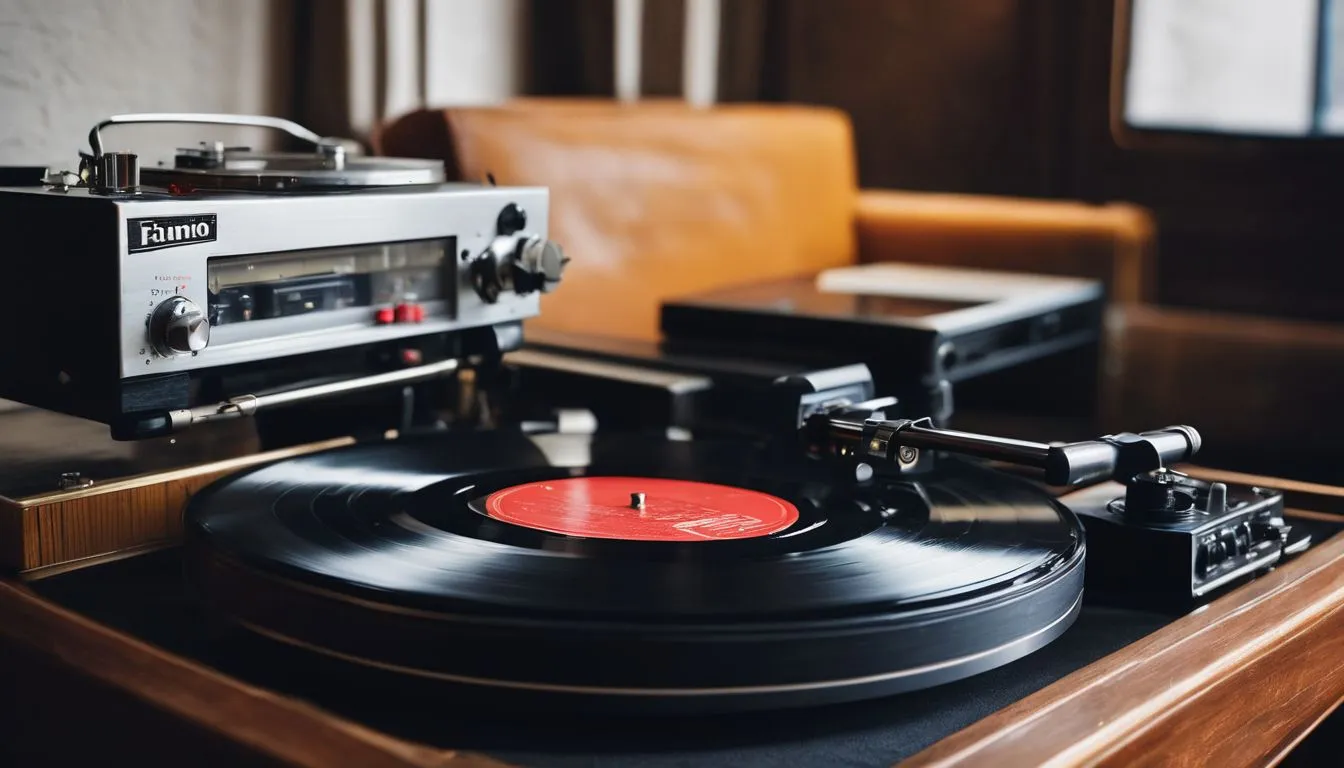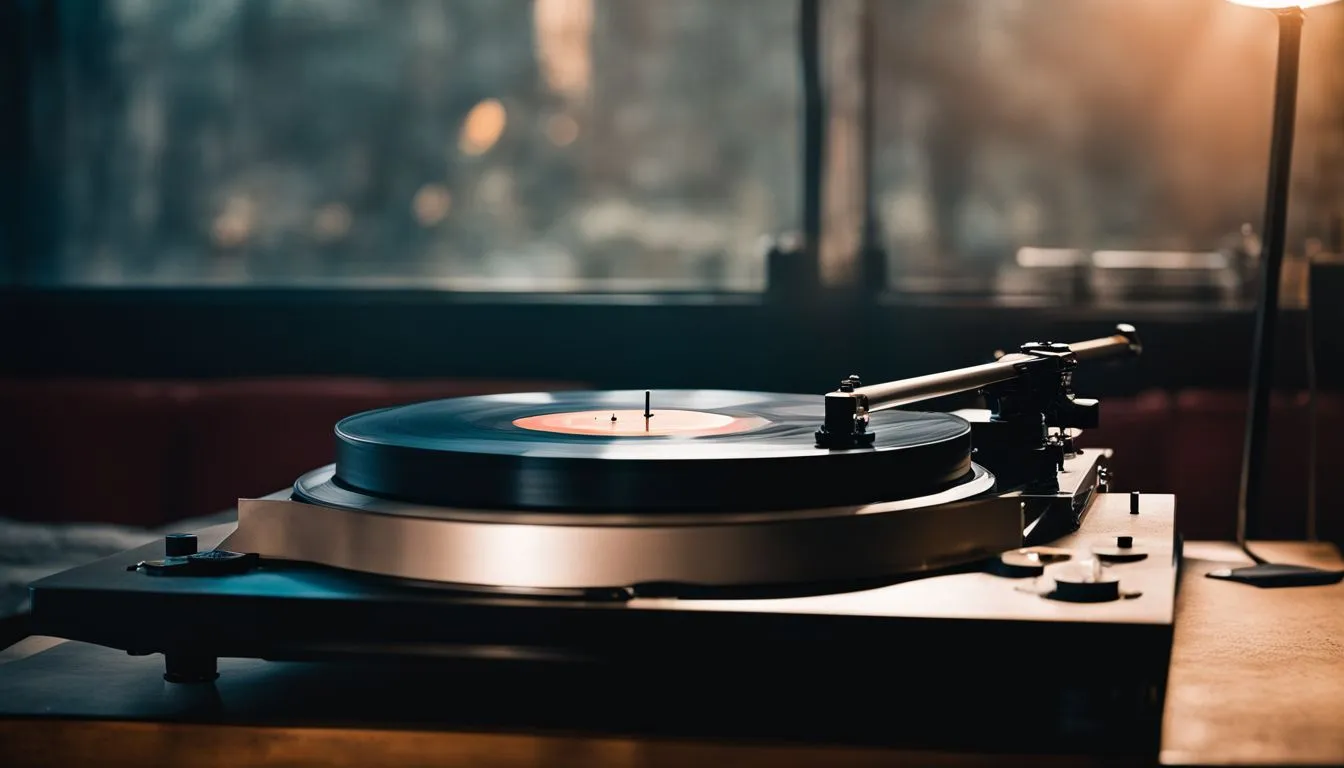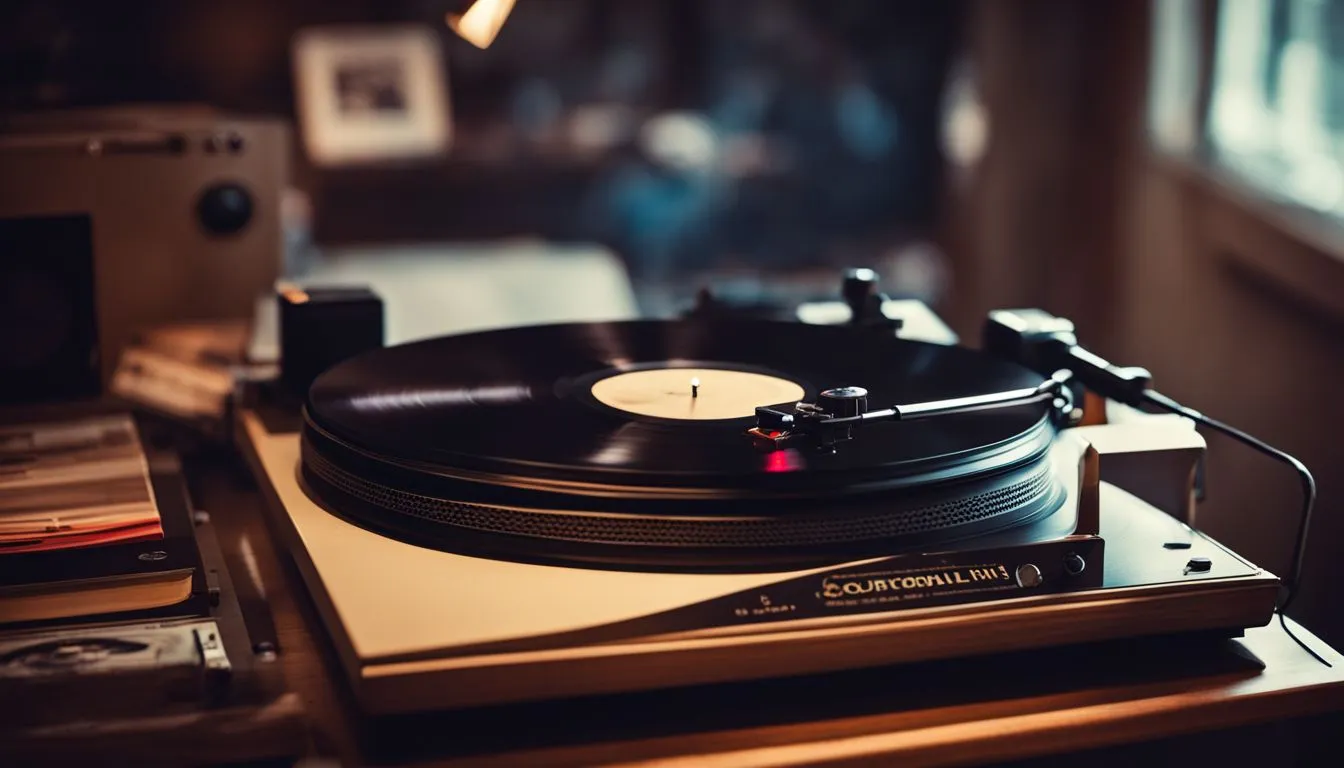You’ve just finished listening to your favorite album, and you’re wondering—is it okay to leave the record on the turntable? It’s a little-known fact that how you handle your vinyl can make a big difference in its lifespan.
Our guide is here to clear up any confusion, providing easy steps to keep your tunes spinning flawlessly for years. Keep reading; we’ve got the lowdown on proper vinyl etiquette!
Key Takeaways
- Leaving a record on the turntable can lead to dust buildup, potential warping due to heat and sunlight, and damage to the stylus and motor.
- To keep records in good shape, brush them with a carbon fiber brush before and after playing, store them upright in sleeves in a cool place, and use a timer or alarm as a reminder to turn off your player.
- Playing records too fast or leaving the player on overnight strains the system and may shorten both record and equipment life. Cleanliness is key for sound quality; always handle vinyl by the edges and use proper cleaning methods.
The Risks of Leaving a Record on the Turntable
Tempting as it may be to keep your favorite vinyl perched on the platter after that last play, doing so might actually invite a few unwelcome guests—dust, damage, and distortion.
Let’s dive into what really happens when your beloved record takes an extended spin on the turntable without even spinning.
Exposure to dust and debris
Leaving your vinyl record on the turntable invites dust and debris to settle on its surface. This dusty layer can create annoying pops and clicks when you play the record. Over time, it also speeds up wear on your stylus as it grinds through the grime.
A clean record is a happy one!
To keep your records in top shape, use a carbon fiber brush before and after playing them. This simple step helps to prevent dust buildup that can damage both your vinyl and turntable needle.
For deep cleaning, opt for a microfiber cloth with proper fluid or consider an ultrasonic cleaner for the best care of your prized collection. Keep that dust cover down when not using your turntable; just remember it might affect sound quality if left down while playing music.
Potential Warping
Heat and sunlight can be big enemies of vinyl records. They might twist or bend your music discs if you leave them on the turntable too long near a heat source. Warping changes how the record sounds, and it could make it skip or sound off.
Even dust covers don’t always keep out all the heat that could hurt your records.
Remember to always put your records away right after playing them. Use good inner and outer sleeves to protect them from warps, dust, scratches, and static zaps. A simple brush-off with a carbon fiber record brush before storing can save your tunes from trouble.
Next up: Damage to the stylus and motor can also happen when you’re not careful with your turntable.
Damage to the Stylus and Motor
Leaving a record on the turntable isn’t just about dust. It puts extra stress on your precious gear. Every time that needle stays down in the deadwax, it’s like running an engine without going anywhere—needless wear for nothing.
The stylus gets dull, and the motor strains to spin with no break.
Imagine this: You forget the record player is on, and that tonearm keeps dragging across the same silent groove. Hours pass, or maybe even overnight! That’s a sure way to invite trouble.
The continuous motion can grind down your stylus faster than usual. Plus, it makes your motor work harder than it should have to. Keeping things spinning smoothly means giving them rest too—just like us!
The Impact of Leaving a Record Player Overnight
You might think it’s harmless to drift off to sleep with your favorite album spinning, but this nightly habit could be setting the stage for an audiophile’s nightmare.
Let’s dive into what really happens when those grooves keep going long after you’ve checked out for the evening.
Possible Consequences
Leaving your record player on overnight might seem harmless, but it can lead to trouble. If the turntable keeps spinning in the locked groove, you’re asking for extra wear and tear on both the stylus and motor.
Think of it as leaving your car running all night; it’s not good for it! The continuous movement strains parts that are meant to rest.
And don’t forget about dust. If a record sits out too long, dust and debris will settle on its surface. This can mute the sound and scratch your precious vinyl over time. You love your music clean and clear, so giving your records a safe home off the turntable is key.
Next up, let’s explore whether speeding up a record could cause damage.
Tips to Avoid Leaving Your Record Player On
You’ve seen the risks; now let’s make sure your records are safe. Here are tips to keep your record player off when it’s not in use:
Does speeding up a record damage it??
Playing records too fast can spell trouble. The extra speed may overwork your turntable’s motor and add wear to the needle, also known as the stylus. Over time, this can harm both the record and the player.
Turning up the tempo might seem fun for a quick listen, but it puts pressure on vinyl’s grooves. They weren’t made for high speeds and can get damaged easier when spun faster than intended.
Keep things moving at the right pace to make your music last longer!
Best Practices for Vinyl Care
Caring for your vinyl collection goes beyond the grooves; it’s about preserving the soul of music itself. Stay tuned to discover how to keep those records spinning flawlessly for years to come.
Proper storage of vinyl records
Keep your vinyl records standing up straight, like books on a shelf. This stops them from bending or getting dents. Use a sturdy record cabinet or crate that can handle their weight without tipping over.
Make sure they’re in a place that’s cool and dry, away from sunlight and heaters. Sunlight can fade the covers, and heat can warp the vinyl.
Always put clean records into fresh inner sleeves before sliding them into the outer jacket. This protects them from dust, scratches, and harmful static electricity. Good sleeves are crucial to keeping your music sounding great for years to come.
Next up, let’s talk about those very important record sleeves.
Importance of Record Sleeves
Record sleeves are like guards for your vinyl collection. They keep records safe from dust, scratches, and static. Think of them as armor—without it, the delicate vinyl can get damaged easily.
Dust acts like sandpaper on a record’s surface when you play it. Scratches make music skip or cause permanent damage to the tunes you love.
Using good-quality inner and outer sleeves is key to protecting your records. It’s not just about keeping them shiny; it also saves your turntable needle from getting dull too soon.
A clean record means less work for the stylus, and that keeps the motor running smoothly for longer periods. Your record storage game needs strong players—and top-notch sleeves are MVPs in preserving your valuable album art and music!
Necessary record cleaning
Keeping your records clean is vital for the best sound quality. Dust and dirt can cause scratching and damage your vinyl.
- Use a carbon fiber record brush.
- Apply a good cleaning fluid with a microfiber cloth.
- Consider vacuum or ultrasonic cleaning machines.
- Store the cleaned vinyl properly.
- Handle records by their edges:
- Keep your turntable clean, too.
Conclusion
Treating your records right means not leaving them on the turntable. Remember, dust and heat can warp and damage your favorite tunes. Give that vinyl a break; put it back on its sleeve right after playing.
Your future self will thank you for the crisp sounds and preserved memories. Care for your music, and it’ll keep spinning just fine!
To learn more about the effects of playing your vinyl at different speeds, check out our in-depth article on whether speeding up a record can cause damage.
FAQs
1. Is it okay to leave a record on the turntable when not in use?
You might think it’s fine to leave your favorite vinyl sitting on the turntable after playing, but hang on! Doing this can damage the record and the player over time. It’s best practice to store your records properly after each use.
2. Can continuous contact with the turntable affect my records?
Absolutely, yes! Leaving a record out can expose it to dust and other particles that could scratch or warp it. Even if you’re hopping back on Amazon.com, Inc. for a fresh one, why risk harm? Always put your records away safely.
3. What about DJs? Do they keep records on their turntables for longer?
DJs often switch between records quickly and may temporarily leave one on a deck while using another. However, even for professional DJs, keeping vinyl in tip-top shape is crucial, so they don’t keep it there longer than necessary!
4. If I forget and leave a record out overnight, what should I do?
No panic is needed; just take action! Clean the record gently with a proper brush or cleaner made for vinyls before you play it again. This will help ensure your tunes sound crisp every time you drop that needle.


